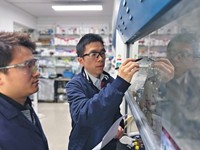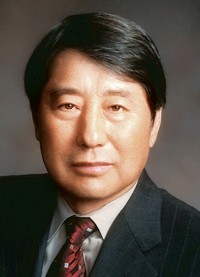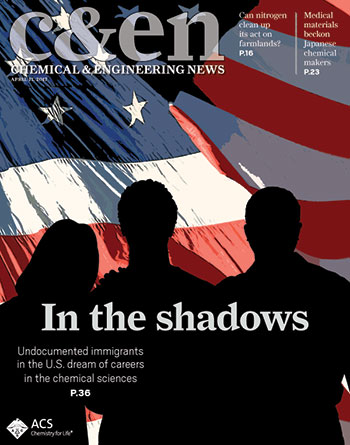Advertisement
Grab your lab coat. Let's get started
Welcome!
Welcome!
Create an account below to get 6 C&EN articles per month, receive newsletters and more - all free.
It seems this is your first time logging in online. Please enter the following information to continue.
As an ACS member you automatically get access to this site. All we need is few more details to create your reading experience.
Not you? Sign in with a different account.
Not you? Sign in with a different account.
ERROR 1
ERROR 1
ERROR 2
ERROR 2
ERROR 2
ERROR 2
ERROR 2
Password and Confirm password must match.
If you have an ACS member number, please enter it here so we can link this account to your membership. (optional)
ERROR 2
ACS values your privacy. By submitting your information, you are gaining access to C&EN and subscribing to our weekly newsletter. We use the information you provide to make your reading experience better, and we will never sell your data to third party members.
Letters to the editor
Diversity in ACS awards
We, the Selection Committee for the ACS Award in Analytical Chemistry, write to express our dismay about the lack of diversity in the nominees for this award over the past several cycles. Not only were no women nominated for this award this year, but no women have been nominated for it in either of the two previous cycles. Similarly, the number of underrepresented minorities does not reflect the growing diversity of the chemical community.
We note that over the past decade, this award has averaged 17 active nominations each year. A lack of diversity is clearly a historical problem: only two nominations of women for this award have been received in the past decade, only two women have ever received this award, and the last award to a woman was made over 16 years ago. Likewise, we are aware of only two nominations of underrepresented minorities over the past decade, one of whom received the award.
Furthermore, for five ACS awards, 2020 marked their first year to have a woman recipient. In fact, some ACS awards have never been awarded to a woman, demonstrating that this problem extends well beyond the ACS Award in Analytical Chemistry.
We appreciate that a significant pool of meritorious nominations of men exists for this award. However, as a committee, we are also aware of a number of women and underrepresented minorities in our field who have similarly compelling credentials but have not ever been recognized for their contributions to the field with a nomination.
We are aware of efforts by ACS to address this serious underrepresentation problem through awards canvassing, but given the persistence of the results we’re seeing, those efforts are insufficient. How can we justly choose an awardee when such a significant fraction of the potential pool has been excluded?
We strongly recommend that all ACS awards expand their criteria to include the service contributions of nominees to the development of an innovative, diverse workforce by requiring all future nominations for ACS awards to include a statement directly describing how the nominee has addressed this important issue.
Since Award Selection Committee members are not permitted to nominate or support nominations for the award on whose jury they serve, we cannot correct this deficiency ourselves. We call upon our fellow ACS members to increase their awareness of the contributions of all of their colleagues and then act to recognize excellence across our community.
If you are considering nominating a man for an award, we request that you ask yourself if there are women or other underrepresented minorities whom you could recruit a colleague to nominate (remember that nominations for most ACS awards remain active for 3 years). We say to all those of you who have previously nominated a woman or someone from an underrepresented group, “Thank you! Please keep on trying!”
We call on the previous winners of this award, department chairs, group leaders, and all our ACS member colleagues to prepare nominations for these missing and qualified women and underrepresented minorities.
Selection Committee, ACS Award in Analytical Chemistry
Open letter to Charles M. Lieber
In response to C&EN’s stories on the allegations against Charles M. Lieber (Feb. 3, 2020, page 3; March 23, page 18; June 15, page 8; Aug 10/17, page 15), a group of former PhD students and postdocs would like to offer our love and support to him.
Hundreds of thousands of people in the scientific community and the rest of the world know of Lieber’s scientific and academic achievements as a pioneer and leader in the field of nanoscience and nanotechnology, the highest-impact chemist in the world [of the 2000s, according to Thomson Reuters], and one of the greatest and most-respected scientists of our generation. Perhaps not everyone knows, however, that he is also a devoted mentor and teacher who has transformed the lives of so many of his students. He is a kind, generous, humble, and empathetic person. These traits have made him a role model to his former students all over the world. Most of us are now scientists, professors, and mentors ourselves in prestigious universities in the US and Canada (46 of us), South Korea (10), Europe (5), and other parts of the world (17). Others hold key positions in industry and business administration (4) or have started companies (2). We have all been blessed and inspired by professor Lieber’s originality, his passion for science, his dedication and commitment to excellence, his persistence, his encouragement to dare to think outside the box, his openness to discussing and sharing with us his ideas, his kindness, and his endless support. Without all of these, we would not be where we are and who we are today.
Many of us have passed on his passion for science, and his dedicated approach to mentoring, to our own students, many of whom are now also scientists, professors, and mentors in their own right. For all this, we wish to thank professor Lieber.
And now, one thing we would like to ask professor Lieber: please stay strong, for yourself, for your family, for all of us, your former students and mentees. We love you and admire you, and we hope to see you soon back at the forefront of science.
Signed by 84 former PhD students and postdocs, 1991–2018.
P. D. Ashby (PhD 2003)
J. F. Cahoon (postdoc 2009–11)
A. Cao (visiting scholar 2016, 2017)
C. J. Chen (PhD 1994)
L. W. Chen (PhD 2001)
C. L. Cheung (PhD 2002)
T. Cohen–Karni (PhD 2011)
Y. Cui (PhD 2002)
H. Dai (PhD 1994)
X. Dai (PhD 2015)
W. Ding (visiting scholar 2004)
Y. J. Dong (PhD 2010)
X. Duan (PhD 2002)
X. Duan (postdoc 2008–12)
Y. Fang (PhD 2007)
T. M. Fu (PhD 2017)
X. P. A. Gao (postdoc 2005–07)
N. Gao (postdoc 2012–18)
J. R. Gong (postdoc 2005–08)
S. Gradecak (postdoc 2004–06)
J. Hahm (postdoc 2000–03)
K. Hata (postdoc 2001–03)
O. H. Hayden (postdoc 2003)
Y. Hu (PhD 2011)
J. S. Hu (postdoc 2008–11)
Y. Huang (PhD 2003)
X. Jiang (PhD 2011)
S. Jin (postdoc 2002–04)
E Joselevich (postdoc 1998–2000)
P. Kim (PhD 1999)
S. K. Kim (postdoc 2010–13)
L. J. Lauhon (postdoc 2000–03)
J. H. Lee (postdoc 2013–17)
Y. Li (postdoc 2003–07)
K. H. Lin (postdoc 2002–03)
J. Liu (PhD 1996)
J. Liu (PhD 2014)
W. Lu (postdoc 2003–05)
S. Nam (PhD 2011)
C. Niu (postdoc 1991–93)
Y. S. No (postdoc 2014–17)
A. Noy (PhD 1998)
T. H. Oosterkamp (postdoc 1999–2000)
M. Ouyang (Ph.D 2002)
W. I. Park (postdoc 2005–07)
H. G. Park (postdoc 2005–07)
J. U. Park (postdoc 2009–10)
F. P. Patolsky (postdoc 2003)
F. Qian (PhD 2008)
Z. Qiao (postdoc 2004–05)
Q. Qing (postdoc 2006–12)
P. Radovanovic (postdoc 2004–06)
W. Y. Shim (postdoc 2012–14)
B. Tian (PhD 2010)
B. P. Timko (PhD 2009)
D. Vezenov (PhD 1999)
D. Wang (postdoc 2001–03)
J. F. Wang (PhD 2002)
Y. L. Wang (PhD 1993)
L. Wang (PhD 2011)
D. Whang (postdoc 2001–04)
C. Y. Wong (postdoc 2005–06)
E Wong (PhD 1998)
A. T. Woolley (postdoc 1998–2000)
X. Wu (PhD 1991)
J. Xiang (PhD 2006)
C. Xie (postdoc 2011–14)
P. Xie (PhD 2008)
Q. Xiong (postdoc 2006–09)
H. Yan (PhD 2010)
C. Yang (PhD 2006)
P. Yang (PhD 1997)
S. I. Yang (postdoc 2000–02)
J. Yao (postdoc 2011–17)
S. Yoon (postdoc 1993–94)
S. You (PhD 2019)
G. Yu (PhD 2009)
Z. Yu (postdoc 2010)
Y. Zhao (postdoc 2016–18)
X. Zheng (postdoc 2006–07)
G. Z. Zheng (PhD 2007)
Z. Zhong (PhD 2005)
W. Zhou (postdoc 2012–15)
S. Zou (PhD 2015).





Join the conversation
Contact the reporter
Submit a Letter to the Editor for publication
Engage with us on Twitter